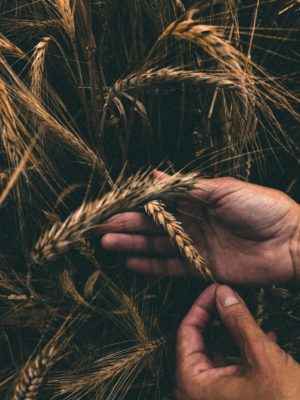You have no items in your cart. Want to get some nice things?
Go shopping
I am thinking about Amrita until Amrita raises her head and says stop and then I am dreaming about Amrita because we have knocked our heads together in the way only children can without dying except maybe I am dying because Amrita says it’s okay to hold her hand.
1.
Amrita is sitting in the shade next to the playground, as she often does. Amrita is saying, I wish you would stop making up stories about me. As she often does.
2.
We sort through the grain fields. In the early morning, when the sun only hits the tallest leafy heads and the air below them is cold and damp enough to crawl through.
Amrita and I do it like ladies: straight spinned, knees to the ground, two hands gripping the wheat stalks, gently. We are passing their stems between our fingers. Moving them aside with the care of our own hair, brushed strand by strand.
Why do you always make us farmers? Amrita asks me.
I don’t say anything. I never say anything if I can help it, words are made of carbon and carbon is just waiting to burn. Even breathing is enough to stoke the flame.
1.
Amrita wakes up with my hands around her hands around my throat. When she pulls away from me she knows that torture is not so different from relief.
Amrita and I talk about my pyromaniac phase and the dream I had about being a witch on a pyre, about offering my throat.
And she knows why.
2.
She’s a better harvester than I am. When she directs my fingers around the stem, she does it with her fingers on my fingers. And when I pull the root out, I pull my fingers away too.
1.
We’re playing with the Barbies in my basement, with the ceiling lights for twin suns and their flickering for the end of the world.
She says the carpet looks like corn stalks and harvests them between her plastic thumbs. That night we have a bountiful harvest, and my mother says I must replace the culled patch myself. I do not mind when Amrita goes home because her Barbie remains, hand as close as it can rest to mine.
2.
She’s just a breath behind my dirt digging knees. And oh the graves authored by these knees. When the mud dries in the sun – flakes off and falls down – it’s only red on the other side. When the hands resting on them – Amrita’s, spindly, rounded, almost nailess at the thumbs – they are bruising red again.
2.
We are standing now – it is too late to hide from the sun. I am forcing my breaths out, I say, There is something wrong in my chest. I grip the place inside where it burns. Amrita averts her eyes to preserve what is left of my modesty. I roll on the ground baking in the heat. Melting in its intensity.
It feels that way, sometimes, Amrita says.
1.
Amrita’s eyes are as brown as they are red. She’s weeping openly from those eyes. Hair longer than my mom will let me grow mine, it sticks to her wet cheeks. The sun is shining in the middle of the sky, burning up everything.
But not her. Amrita is under the shadow of the playground equipment saying, I don’t play pretend games anymore.

About Josie Levin
Josie Levin is a visual artist and writer. She splits her time between Indianapolis and Chicago, reads large volumes of books and occasionally writes her own. She has been published in several publications, including Penumbric Magazine, The 2River View, and Witness Magazine.




